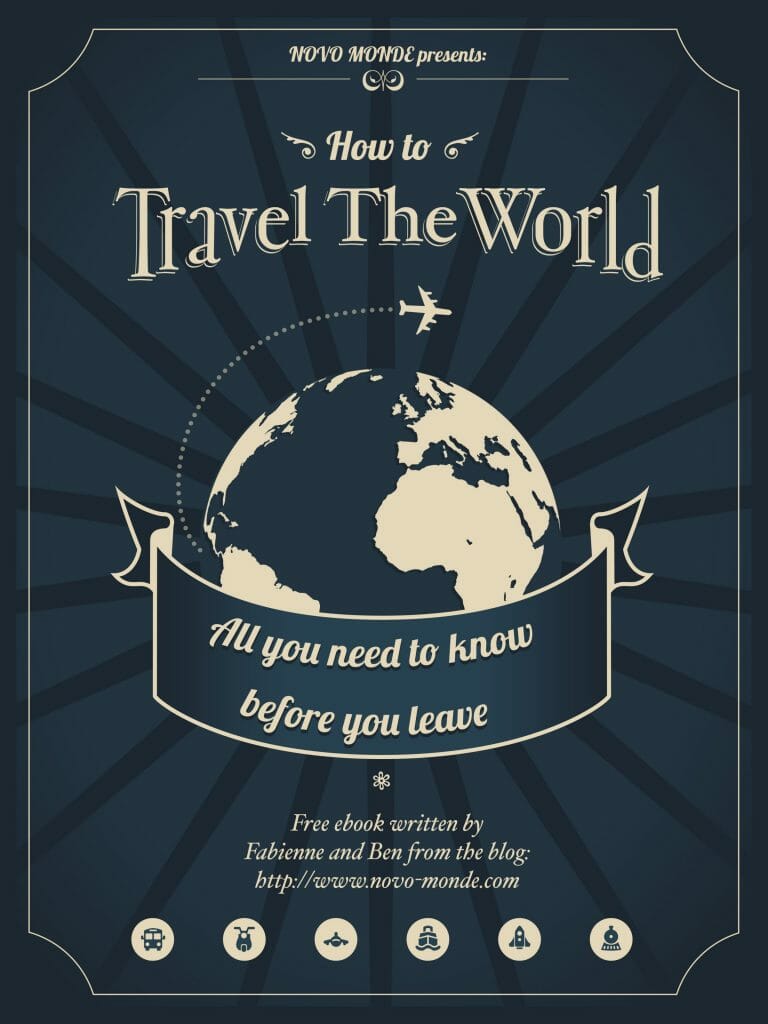Issues related to travel insurance for Swiss citizens who embark on a world tour or long-term travel are quite different from those faced by French travelers. In Switzerland, the equivalent of the French Social Security is called KVG. This insurance is mandatory for all individuals domiciled in Switzerland and, most importantly, is VERY expensive!
Imagine, at the time of writing, the cheapest coverage with the highest deductible costs at least 200 CHF per month... which represents a budget of 2,400 CHF per year - an enormous expense for an RTW trip budget when compared to the prices of world tour travel insurance that French travelers take! The worst part is that the price of this insurance increases almost every year :(. The question that every Swiss person planning a world tour asks is therefore:
How can I be properly covered while avoiding paying for KVG during my trip?
We'll try to provide a clear answer to this question in the following paragraphs.
This topic for Swiss travelers is a bit complicated, and we've received numerous comments (in French, but which we recommend translating) on this article. But I'll still try to give you a summary.
The problem for most people reading these lines is the following: How to stop paying for KVG when leaving for long-term travel while keeping your domicile in Switzerland?
Since 2017 and the publication of this article, it's no longer legally possible to cancel your KVG without registering your papers abroad. But as you'll see by reading the comments, some people have still managed to do so because not all health insurance companies are aware of this issue, which is very specific to long-term travelers.
In fact, in 2021, a Swiss traveling couple, Valentine and Philippe, shared with us in detail on this page how they managed to cancel their KVG before leaving with their van for an indefinite period.
Otherwise, you can also read this comment and this one (both in French), which are very comprehensive and should help you make your decision.
The solution that worked until 2017
In 2013, the year we left for our RTW trip, the situation regarding mandatory health insurance in Switzerland and departures for long-term travel was rather unclear. After visiting the SIA (Social Insurance Agency) in our municipality, we were advised to request globetrotter status. This status allowed us quite a few things at the time:

- Continue to contribute the minimum to AVS (the first pillar of the Swiss retirement system) to avoid losing years of contributions for our future retirement.
- Declare our departure from our municipality of residence (and thus receive a departure certificate) while keeping a correspondence address (but not a tax address) there.
- Not have to file a tax return during our trip (since we no longer had a tax domicile)
- Thanks to the departure certificate from the municipality, we were able to cancel KVG and subscribe to an international travel insurance.
The only hitch in all this reasoning was that most international travel insurance covers you everywhere except in your country of residence. Having a correspondence address in Switzerland allowed us to subscribe to these travel insurances. But what would happen if something serious happened to us and we were repatriated to Switzerland?
At the time, we based our decision on an article from the Federal Office of Public Health, which states that health insurers must accept all insured persons regardless of their health status and must pay any potential costs retroactively if the insured person has applied for membership within 3 months after reregistering in Switzerland.
Basically, if something serious had happened to us and we had been repatriated to Switzerland, we (or someone from our family) would have immediately reregistered our papers in a municipality and applied for insurance membership that would have had to reimburse us for any potential costs retroactively. Well, we secretly hoped that nothing would happen to us and that we wouldn't need to test our theory, but still.
The article that changed everything in 2017

But in 2017, we saw an article from the Federal Office of Public Health that changed everything. Basically, mandatory health insurance (KVG) can no longer be canceled for a world tour because the act of declaring your departure to your municipality of residence is not sufficient on its own to end your domicile in Switzerland. (Basically, if you don't register your papers abroad, you're not really de-domiciled from Switzerland.) We assume they received too many requests for globetrotter status for long-term travel and wanted to clarify the situation 🙂
Even though KVG remains an insurance that covers us for medical expenses abroad (but only for medical expenses as explained in this article, not for public liability, cancellations, or theft), its price remains exorbitant compared to international products with equivalent (or even much more extensive) benefits. So we thought it couldn't end like this and continued digging for more information.
A comment on our travel insurance article helped us find more information on the subject. We discovered that according to the Health Insurance Ordinance (in French), you can be exempted from the obligation to insure if you have concluded travel insurance that would cover the costs of illness first, and not follow the basic insurance, worldwide (including Switzerland).
Basically, this means that if you find insurance that covers you from the first euro (and not in addition to basic insurance) wherever you travel, including Switzerland, you have the right to request exemption from the duty of insurance from the competent cantonal institution.
Of course, we didn't test this solution since we had opted for the solution described above in 2013. But in our opinion, it's really worth contacting your competent cantonal authority (see link above), telling them that you're leaving for an indefinite period of travel and that you would like to be exempted from your duty of insurance because you have subscribed to insurance more suitable for your trip.
But you told us that international travel insurance covers everywhere in the world except in your country of origin!
That's true for most of them. Even Chapka, which insures medical expenses from the first euro and insures you for an additional 30 days in your country of domicile in case of return from travel, has confirmed to some readers that they are not intended to replace the Swiss KVG (see this comment).
We also looked at SafetyWing's brand new international health insurance offering (Remote Health, which was released in 2021), which aims to be comprehensive health insurance for nomads. Unlike other travel insurance (and it's the only one to our knowledge), it covers you without limits in your country of residence and should therefore theoretically be accepted as a replacement for KVG. We must admit that this solution appeals to us because it would be a bit cheaper than KVG... By the way, we welcome feedback if any of you have experience with this!
So in 2022, in our opinion, you have the following possibilities:
- Either you accept being in a "grey zone". So you manage to cancel KVG (which is much more difficult since 2017 and officially no longer allowed) and take out classic travel insurance. This way, you also assume that if you are repatriated due to a serious mishap, KVG will reimburse you retroactively after you have reregistered your papers no later than 3 months after your return. If you want more details on this subject, I invite you to read this page written by Valentine and Philippe, who left on a trip in March 2021 for an indefinite period and managed to cancel their KVG.
- Or you accept having to pay for KVG and simply take out supplementary travel insurance in addition to the basic coverage to cover medical expenses abroad, repatriation, and civil liability. We're actually thinking about doing some research to find the best supplementary travel insurance offers in Switzerland to limit the budget damage. If you have any suggestions, we welcome them in the comments ;). Moreover, if you had little income during your trip and don't have a large fortune, you may also be eligible for cantonal subsidies for health insurance, which could significantly reduce your KVG bill (in year + 2).
- There's also the solution of the new SafetyWing Remote Health coverage, but we don't know yet if it works.
As I mentioned above, the situation in 2013 when we left was a bit different, and it's now much more difficult to cancel KVG. We thank all the people who have since shared their experiences in the comments to help future Swiss travelers. If you too have gone through this and have struggled with all this, we would be grateful if you could give us feedback in the article comments and tell us if you managed to get exempted from KVG or not. And obviously, if you've found another solution to this puzzle for Swiss world travelers, we're obviously open to your solution 😉
Other tips/remarks for Swiss travelers
Tax optimization: leaving (and returning) straddling 2 years
If you keep your tax domicile in Switzerland (there's less reason to request departure from your municipality if it no longer allows you to cancel KVG), you can save quite a bit of money on your taxes by straddling 2 years (i.e., between June and September).
As Malik very well explained in this comment, let's say you pay about 10,000 CHF in taxes per year. If you leave in July and withdraw your tax domicile from Switzerland, the Swiss tax authorities will take into account your 1st semester and charge you about 5,000 CHF in taxes. On the other hand, if you keep your papers in Switzerland, you transform in the eyes of the Swiss tax authorities into a person with modest income because you will earn only half of your usual salary over a complete fiscal year. As the Swiss tax system is not linear, you will end up paying MUCH less tax (only about 1,500 CHF).
We also somewhat benefited from this tip when we returned from our world tour. Fabienne had found a job starting in early April and Ben in early May... So the first year, we didn't pay much tax because over the complete fiscal year, we hadn't earned a lot of money compared to Swiss standards.
Families on travel: family allowances
We met several Swiss families who were doing long-term travel and receiving family allowances as persons without gainful activity. To be entitled to family allowances, you must be domiciled in Switzerland, be recognized as a person without gainful activity in the sense of the OASI (like the globetrotter status) and have a declared income of less than 42,300 CHF per year (so think about your departure date in relation to this too!). The allowance is a fixed sum paid per month that depends on the number of children and your canton of residence.
That's it for this article, which was highly requested by many of you. We know that the topic of travel insurance is indigestible (especially for Swiss people), but leaving well-insured for long-term travel is a necessity. So even if it's a pain, it's important to dedicate time to find the right insurance coverage for your trip.
We hope we've answered the majority of questions from future Swiss world travelers, and we look forward to reading your experiences in the comments!










Join the discussion